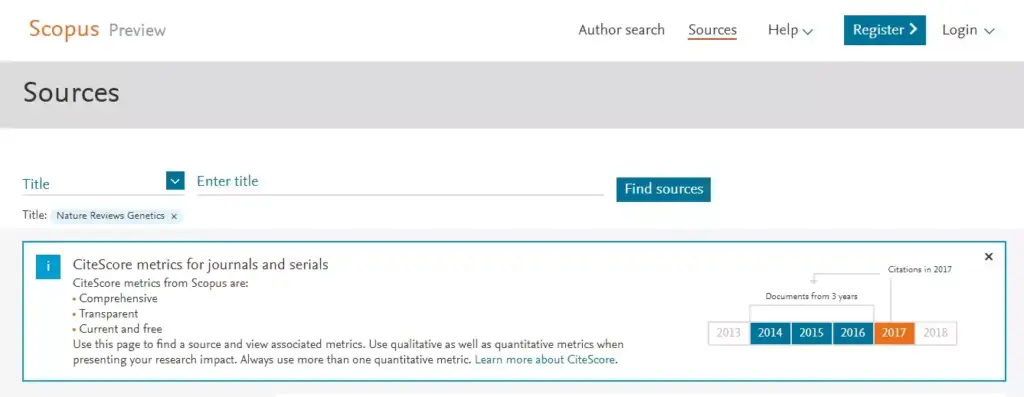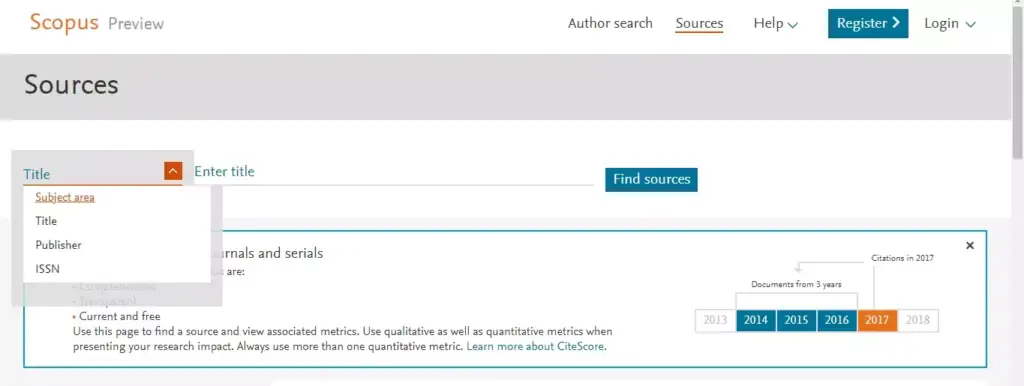For researchers and scholars, getting their work published in reputable journals is a crucial step in sharing knowledge and gaining recognition in their respective fields.
Scopus indexed journals, known for their rigorous quality standards and wide readership, are highly sought after.
In this blog post, we will guide you through the process of finding Scopus indexed journals, ensuring that your research reaches a broader audience and receives the recognition it deserves.
Read More: What is Scopus Indexed Journal?
Step-by-Step Guide to Find Scopus Indexed Journals
Step 1: Accessing Scopus
To begin your search for Scopus indexed journals, you need to gain access to the Scopus database. Scopus is a subscription-based service, and many universities, research institutions, and libraries provide access to their affiliated members.
Check if your institution has a subscription or consider using alternative access options such as interlibrary loan or public libraries that may offer access to Scopus.
Step 2: Visit the Scopus Website
Once you have access to Scopus, visit the official Scopus website (https://www.scopus.com) and log in with your credentials.
If you do not have an account, create one by following the registration process.
Read More: Why Do Paid Scientific Journal Publications Exist?
Step 3: Navigate to the Journal Search Page
After logging in, you will be directed to the Scopus homepage. Look for the “Sources” tab in the top navigation bar and click on it. This will take you to the Journal Search page, where you can explore Scopus indexed journals.

Step 4: Select Search Criteria
On the Journal Search page, you will find various search criteria to narrow down your search for Scopus indexed journals. These criteria include:
- Title: If you have a specific journal in mind, enter the journal title in the search bar.
- ISSN: If you know the ISSN (International Standard Serial Number) of a journal, enter it to find the specific journal you are looking for.
- Subject Area: Scopus covers a wide range of disciplines. Choose the subject area that aligns with your research interest to explore relevant journals.
- Publisher: If you prefer journals from a particular publisher, you can specify the publisher’s name in this field.

To find the Scoups indexing, choose the targeted journal’s title, publisher, or ISSN number.
Step 5: Filter by Indexing
To find only Scopus indexed journals, scroll down the Journal Search page and look for the “Refine your search” section. Under the “Source Type” filter, select “Journals” to narrow down your search to journals only. Then, under the “Scopus Source Status” filter, choose “Indexed” to display only Scopus indexed journals.
Read More: List of Cloned Journals
Step 6: Review Search Results
After applying the necessary filters, Scopus will display a list of journals that match your search criteria. Review the search results to find journals that are relevant to your research area and interests. The results will include information such as the journal’s title, ISSN, publisher, subject area, and more.
Read More: Q1 Journals: How Q1 Journals are Calculated?
Step 7: Explore Journal Details
Click on a journal’s title from the search results to access its detailed information. This page provides you with a wealth of information about the journal, including its scope, editorial board, publication frequency, submission guidelines, and indexing information.
Step 8: Evaluate Journal Metrics
While exploring a journal’s details, take note of its metrics, such as the journal impact factor, CiteScore, and SJR (Scimago Journal Rank). These metrics can provide insights into the journal’s influence and reputation within the academic community.
Read More: List of Free Open Access Journals | All Fields
Step 9: Access Journal Articles
If you have found a suitable Scopus indexed journal, you can access its articles by following the provided links or by visiting the journal’s website directly. Ensure that you comply with any subscription or paywall requirements.
Read More: How to Write a Scientific Research Paper Using Google Bard AI?
Conclusion
Finding Scopus indexed journals is an essential step for researchers aiming to publish their work in reputable and influential publications.
By following the step-by-step guide outlined above, you can navigate the Scopus database effectively, identify relevant journals within your research field, and make informed decisions about where to submit your work.
Remember to consider factors beyond indexing, such as the journal’s scope, readership, and reputation, to ensure the best fit for your research.
Other articles
Please read through some of our other articles with examples and explanations if you’d like to learn more about research methodology.
Research
- Finding Scopus Indexed Journals
- List of the Top 100 Google Scholar Journals
- Resources for PhD Literature Review
- Journal Publication Ethics for Authors
- Traditional Research vs. Action Research
- Modern Research vs Traditional Research
- How to Reach a Wider Audience in Research
- Conflict of Interest
- Qualitative Research MCQ Quiz
- Detecting and Addressing Plagiarism
- Research Methodology Quiz
- Do All References in a Reference List Need to Be Cited in Text?
- How to Ask Respondents To Fill Out a Dissertation Survey?
- Co-author Uses ChatGPT for Acedemic Writing. Is it Ethical?
- Article Retraction in Academic Publishing
- Write a 10 and 20-Page Research Paper in One Night
- Journal Submission Hacks
Research
- “et al.”: in APA, MLA, and Chicago Style
- Reasons for Manuscript to Be Rejected
- GPTzero Detects ChatGPT-Generated Research Articles
- Why Do Paid Scientific Journal Publications Exist
- List of Free Open Access Journals
- Conduct Community Member Research Interviews
- Scopus Indexed Journal
- Timeline for Writing a Research Paper in a Month
- Finding Scopus Indexed Journals
- Interesting Facts About Sci-Hub
- Chicago Style Format
- MLA Citations
- APA Citations
- Sci-Hub Proxy Links
- Write Scientific Research Paper Using ChatGPT
- Plagiarism and Paraphrasing
- Q1 Journals: How Q1 Journals are Calculated?
- AI Detection Tools for ChatGPT-Generated Research Articles
- Types of Plagiarism
PhD
- Peer Pressure in PhD Research
- Freelancing Ideas for PhD Researchers
- Consistency in Ph.D. Research
- Cope with a Problematic PhD Supervisor
- Pros and Cons of Being an Older Student in a PhD Program
- PhD Students Seeking Industry Jobs
- Complete PhD in 3 Years
- Highest Paying PhD Degrees
- Completing PhD in 36 Months
- From PhD to Industry: Books to Aid Your Transition
Statistics
Methodology
- Research Methods
- Quantitative Research
- Qualitative Research
- Case Study Research
- Survey Research
- Conclusive Research
- Descriptive Research
- Cross-Sectional Research
- Theoretical Framework
- Conceptual Framework
- Triangulation
- Grounded Theory
- Quasi-Experimental Design
- Mixed Method
- Correlational Research
- Randomized Controlled Trial
- Stratified Sampling
- Ethnography
- Ghost Authorship
- Secondary Data Collection
- Primary Data Collection
- Ex-Post-Facto
- Research Methodology Books
Research
- Table of Contents
- Dissertation Topic
- Synopsis
- Thesis Statement
- Research Proposal
- Research Questions
- Research Problem
- Research Gap
- Types of Research Gaps
- Variables
- Operationalization of Variables
- Literature Review
- Research Hypothesis
- Questionnaire
- Abstract
- Validity
- Reliability
- Measurement of Scale
- Sampling Techniques
- Acknowledgements



